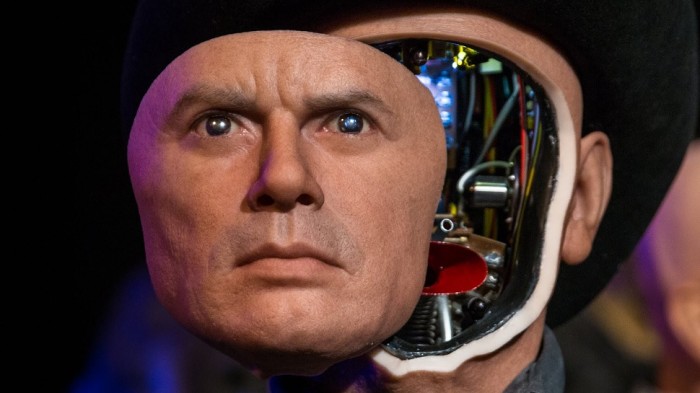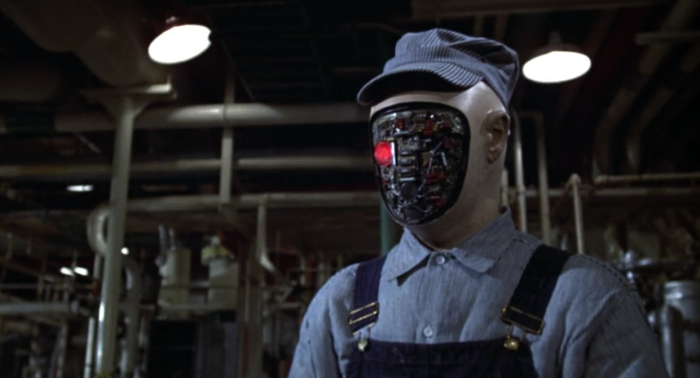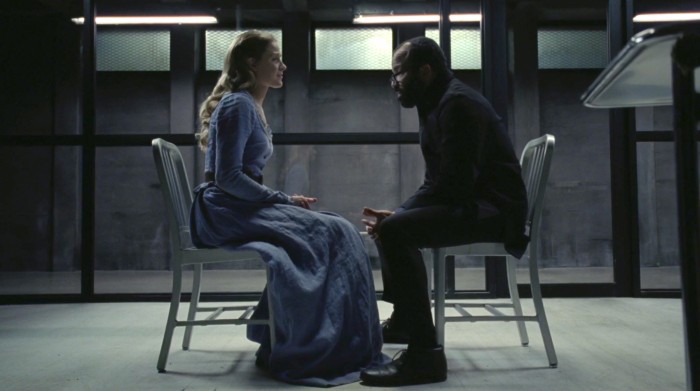Echoes Through Time: 45 Years Of 'Westworld'
Two men ride in on a train, dressed in casual clothes. They're headed for a vacation, but we're not sure where. Judging from the landscape passing out the locomotive's windows, it's easy to guess the American heartland. But that assumption would indicate that their destination is of natural creation – a product of God's Design, crafted in a manner we're still attempting to comprehend. No, entry to where these two well-off individuals are going includes a rather sky-high ticket price, as the arena was manufactured merely to provide them the greatest "violent delights".
Welcome to Westworld. Leave your suit jacket by the door, as your "host" will see that you're fitted for either cowboy boots, a Roman Toga, or a suit of armor, so that the adventure you've paid good money for can begin as soon as you march out into this artificial realm.
Westworld was born 45 years ago and it is, somehow, still alive and kicking and breaking minds today.
The Unusual Cinematic Career of Michael Crichton
Like many filmmakers from the New Hollywood era, Michael Crichton credited Dennis Hopper's Easy Rider ('69) as being his inspiration for wanting to get behind a camera. By '69, Crichton had published four novels; pulpy diversions penned under pseudonyms "John Lange" and "Jeffrey Hudson" (both of which were clever nods to his towering, six-foot-nine frame) while studying medicine at Harvard. Speaking with Vogue Magazine '73, Crichton said, "I was lucky because at the point I decided I wanted to direct films, Easy Rider had convinced studio executives to look for new talent, and it seemed as if anybody who could speak in declarative sentences – and a lot of people who couldn't – were going to get to make films."
Crichton's first directing gig came in '72, three years after his viral thriller The Andromeda Strain made him a household name, and was subsequently adapted into a feature film by West Side Story ('61) co-director Robert Wise. Based on his book Binary, Crichton only agreed to sell the rights if he could helm the ABC TV movie starring Ben Gazzara and Martin Sheen. The network agreed, and the author put down his pen and started studying lenses, cutting his teeth on the small screen iteration of his own tale.
Westworld ('73) was already in the works by the time Pursuit aired as a Movie of the Week, as Crichton had the screenplay written and out to studios for consideration. Like another one of his famous stories (which involved dinosaurs), Westworld was an allegorical sci-fi yarn where an elaborate theme park is built to satiate the rich's need to escape into another age. There are several periods to choose from – Medievalworld, Romanworld, and the titular dusty realm of gunslingers and prostitutes. The robot "hosts" are programmed to fulfill the guests' every desire, and safeguards are put into place so that the human participants can never be harmed. But if Crichton's science fiction has taught us anything, it's that when mankind attempts to play God, they find their creations bucking against control, as the robots turn on the tourists and begin murdering them with swords and revolvers, causing a mass panic both in the park and behind the scenes, where operators diligently man omnipotent computers.
There's a jangly untested quality to Crichton's debut that both signals his unsteadiness behind the camera, as well as MGM's uncertainty regarding the material (they were the only studio Crichton wasn't rejected from outright, and had an industry reputation for producer meddling/re-cutting). James Brolin and Richard Benjamin's businessman characters are our guides to this otherworldly dream of history, where those with the deepest pockets get to play cowboy to their heart's content. Crichton – along with cinematographer Gene Polito (Colossus: The Forbin Project ('70) – approach the affair with attention to both the dusty alleys of the town, and the beeping, bleeping back rooms of the park's inner sanctum, where technicians comb through data and ensure that their synthetic entertainers behave themselves in every thought and action. It's as if we're witnessing God and His Kingdom, all at once, and creation is purely present for pleasure.
Thank goodness for Yul Brynner, who essentially reprises his iconic role from The Magnificent Seven ('60) as the black clad deadliest gun in this artificial Old West. He brings stoic, intimidating menace to a movie that would otherwise feel too jokey and contained for its own good; a true testament to the King & I ('56) star's unmistakable screen presence. Suddenly, a picture from an unsure rookie and his equally insecure financial backers transcends its meager $1 million budget, and mints its own towering iconography. Through familiarity, Westworld became unique, twisting the gunslinger archetype into an unnatural marauder from the future, viewing us through infrared vision like a precursor to the alien hunter in Predator ('87) with metal gears that grind behind his bald, fleshy dome.
Westworld opened to fantastic reviews and became MGM's highest grossing title of '73. While the author continued to churn out pulpy texts, he also helmed five more features (including this writer's personal favorite, Looker ('81). Crichton's vision of the future was not only spun off into two other installments in the Westworld universe, but also influenced generations of genre filmmakers to come. Just look at James Cameron's masterpiece The Terminator ('84) for the premier example. Do you think it's coincidence that Cameron's own killer robot sees through similar eyes as Crichton's death dealing quick draw? In an '85 chat with Film Comment, the King of the World discussed the two films' likenesses, dissing the cowboy's dearth of a shiny and chrome endoskeleton as being "not visually satisfying." Cool story James, but it's pretty clear Harlan Ellison wasn't the only source of inspiration you borrowed from.
Futureworld
While Michael Crichton's first theatrical writing/directing effort was a hokey cautionary tale about what happens when man meddles with science – predating Jurassic Park ('93), his other bonafide classic that would explore said through-line in a theme park setting – Richard T. Heffron's sequel Futureworld ('76) is a lighter, goofier expansion on this microcosm of mechanical vacations. Where James Brolin and Richard Benjamin engaged in gunfights and screwed android prostitutes, Peter Fonda and Blythe Danner's most taboo recreational activity is playing a game of violent, technicolor chess, causing the living pieces to kill each other for sport. This single scene acts as an intriguing metaphor for how we, the audience, are even viewing these pictures. Like the tourists who come and go to the Delos Resort, it's all a game, here for our matinee amusement.
Yet that's part of Futureworld's charm. Heffron's follow-up – written by regular TV scribes Mayo Simon and George Schenck – lacks the moralism that Crichton deemed customary to sci-fi, instead taking the viewer on exciting journeys through Delos' uncharted fantastical territories. You ever think it'd be cool to ski down the red slopes of Mars? Futureworld has it. How about engaging in a little medieval jousting? Futureworld's got that, too. As Fonda and Danner's journalists explore the newly reopened theme park (again proving that potential profits will always trump safety), it becomes readily apparent that this isn't necessarily "idea" driven sci-fi, but a roller-coaster bit of futuristic forecasting. It's Westworld filtered through Disney's Space Mountain ride, lacking the sense of danger the original owned outright.
However hammy it may be, Futureworld still packs a number of its own ideas into its rather briskly paced 108-minute runtime. The notion of newspapers being an antiquated medium for people to consume their daily bits of journalism and information is presented through its heroes' job concerns. This creates an initial competition between them, as Danner's TV correspondent is disgusted when Fonda's old school print "Neanderthal" is asked to join in on the fun of exploring the new and improved Delos, raining on her "Exclusive!" parade. While the subsequent reveal that the two had a personal relationship undermines this subtext almost immediately, it's still somewhat fascinating to watch what's essentially nothing more than a lo-fi, B-Movie cash-in try to predict how technology would affect print media in the upcoming decades.
Once Futureworld narratively pivots into a predictable storyline revolving around a human conspiracy to keep Delos open, Heffron's picture suffers from a few thematic hiccups. But those inconsistencies in quality are soon forgiven once we're introduced to a machine that's able to read and interpret our journo heroes' dreams. Futureworld then dabbles in '70s psychedelia, as we're witnessing a feverish reverie in which Danner dances with iconic cowboy Yul Brynner after he rescues her from stalkers dressed in red robes David Cronenberg would go on to swipe for the surgical scenes in Dead Ringers ('88). By no means "essential cinema," the first follow-up to Westworld essentially still provides what Delos was trying to deliver to its guests: an escape from reality into another time and place not our own, where we can live out dreams for a few hours before returning to our mundane existences.
A Whole New World
Where the majority of Crichton's Westworld and Heffron's Futureworld revolved around the humans' journey to this chaotic fantasyland, HBO's series revival of Crichton's original concept – the first season of which is dubbed The Maze – is more interested in trying to comprehend the artificial minds that're molded in the name of entertainment. It's peak "prestige television" – taking ideas that were originally presented in the form of pure pulp and fleshing them out into philosophical treatises on the nature of self, and what it means to be sentient. HBO's Westworld is probably more Philip K. Dick than it is Michael Crichton, but certainly has fun tipping a dusty brim toward its source (a Medievalworld statue! Yul Brynner's gunman! The samurai!).
While Crichton was always generous when giving journalists a peek behind the sausage factory doors of Westworld's production, he was also candid about how his film was cut by ten minutes in post to achieve a PG rating. The HBO series feels like the logical reclamation of Crichton's original vision, which was just as much about how human beings were granted a freedom to exercise their cruelest impulses in this manufactured Wild West, choosing between whether they wanted to be an upstanding sheriff or the local outlaw, who kills and rapes at will. It's an insight into impulse that horror filmmakers like Eli Roth would take to the most extreme extent in his Hostel pictures ('05, '07), where the world's 1% pay for the opportunity to torture and kill an innocent person, free of any consequences. There's a reason Dolores Abernathy (Evan Rachel Wood) – a synthetic host who lives out a peaceful existence with her rancher father (Louis Hertham) – is the first character we meet, questioned by one of her creators (Jefferey Wright). The show is much more about the emotional and physical damage inflicted by humans in their pursuit of pleasure, than it is the pleasure itself.
This is what makes the HBO series so compelling – it knows what we're innately wondering when watching Crichton's now antiquated piece of pop pulp ("do these robots have feelings about any of this?") and grants the androids interior lives that are thoroughly explored. It also spends plenty of time fleshing out the political struggles behind the scenes of this great attraction – from its mastermind (Anthony Hopkins), down to the lowly scientists (such as Wright) who interpret the endless data they mine from watching these machines essentially live out the same day over and over again. Then – as if unsatisfied with simply expanding the universe – series heads Jonathan Nolan (The Dark Knight) and Lisa Joy (Pushing Daisies) take Crichton's iconography and upend it. No longer is the Man in Black (played here by Ed Harris) just a figure of intimidation, he represents the end result of when humans finally decode this "maze" their experiencing. To give any more away would ruin the series' many twists and turns; a labyrinth of interrogation extracted from what began as nothing more than a $1 million matinee diversion.
In the end, Westworld might be the greatest example of what made Crichton such a ubiquitous cornerstone of pop culture; a scribe who we may still not give enough credit to. Like Larry Cohen (Q: The Winged Serpent ['82], The Stuff ['85]), he was king of the narrative hook. Nolan and Joy simply took that riff and updated it for the modern audience, stuffing it with even bigger ideas and then molding it into a ten-episode structure, supported by Executive Producer J.J. Abrams' affinity for Mystery Box storytelling. Just as love ends up transcending time and memory by the end of The Maze, the narrative conceit of Westworld is one that's transmutated through generations, only to end up delivering what its author always intended: heady sci-fi that transports us to an arena not our own, where violent delights and the questioning of existence await.

